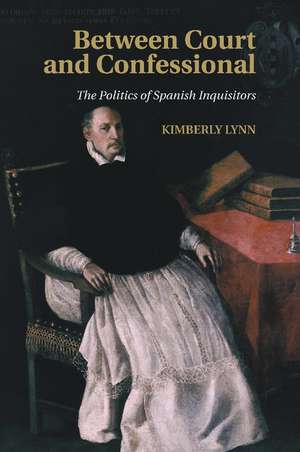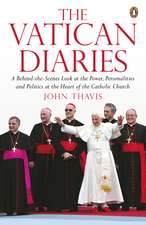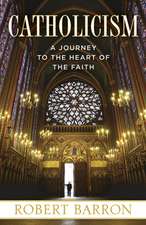Between Court and Confessional: The Politics of Spanish Inquisitors
Autor Kimberly Lynnen Limba Engleză Paperback – 8 apr 2015
| Toate formatele și edițiile | Preț | Express |
|---|---|---|
| Paperback (1) | 244.88 lei 6-8 săpt. | |
| Cambridge University Press – 8 apr 2015 | 244.88 lei 6-8 săpt. | |
| Hardback (1) | 532.69 lei 6-8 săpt. | |
| Cambridge University Press – 7 iul 2013 | 532.69 lei 6-8 săpt. |
Preț: 244.88 lei
Nou
Puncte Express: 367
Preț estimativ în valută:
46.86€ • 49.27$ • 38.72£
46.86€ • 49.27$ • 38.72£
Carte tipărită la comandă
Livrare economică 17 aprilie-01 mai
Preluare comenzi: 021 569.72.76
Specificații
ISBN-13: 9781107507302
ISBN-10: 1107507308
Pagini: 410
Ilustrații: 7 b/w illus. 3 maps
Dimensiuni: 152 x 228 x 25 mm
Greutate: 0.6 kg
Editura: Cambridge University Press
Colecția Cambridge University Press
Locul publicării:New York, United States
ISBN-10: 1107507308
Pagini: 410
Ilustrații: 7 b/w illus. 3 maps
Dimensiuni: 152 x 228 x 25 mm
Greutate: 0.6 kg
Editura: Cambridge University Press
Colecția Cambridge University Press
Locul publicării:New York, United States
Cuprins
Introduction: arbiters of faith, administrators of empire; 1. Visiting the flock: the pastoral agenda of Cristobal Fernandez de Valtodano; 2. Writing the inquisition: the trials of Diego de Simancas; 3. Courting the king, courting the pope: Luis de Paramo between Spain and Italy; 4. Falling from grace: the disenchantments of Juan Adam de la Parra; 5. Negotiating the Catholic monarchy: the transatlantic maneuvering of Juan de Manozca y Zamora; 6. Building careers, making a legal culture: toward an appraisal of inquisitorial office; Epilogue: the afterlife of Spanish Inquisitors.
Recenzii
'The Inquisitor is a figure engulfed in myth, yet about whom very little is actually known. Kimberly Lynn sets the record straight in this thoroughly researched and well-written book. Showcasing individual portraits of five inquisitors from different parts of the early modern Hispanic empire, she offers a lively and convincing composite biography of a unique - and uniquely complex - figure poised between medieval theocracy and modern bureaucracy.' James S. Amelang, Universidad Autónoma, Madrid
'This outstanding piece of scholarship demonstrates how little the Spanish inquisitors fit the conventional view of them as insular men in single-minded pursuit of heresy. In a series of exacting and illuminating portraits, Kimberly Lynn reveals them in the full range of their activities, engaged in turf battles, jostling for position at court, moving from post to post, suffering career setbacks and disappointments, and seeking patronage and bestowing patronage - that is, negotiating the complex power structures of early modern Spain like other members of the power elite.' Miriam Bodian, University of Texas, Austin
'… carefully researched … enlightening … we emerge much the wiser about what made these men tick.' History Today
'Lynn's masterful book merits a place alongside the work of other well-respected scholars, such as James Amelang and Francisco Bethencourt. It deserves to be read by anyone with an interest in early modern Spain or early modern Catholicism.' Jan Machielsen, European History Quarterly
'This outstanding piece of scholarship demonstrates how little the Spanish inquisitors fit the conventional view of them as insular men in single-minded pursuit of heresy. In a series of exacting and illuminating portraits, Kimberly Lynn reveals them in the full range of their activities, engaged in turf battles, jostling for position at court, moving from post to post, suffering career setbacks and disappointments, and seeking patronage and bestowing patronage - that is, negotiating the complex power structures of early modern Spain like other members of the power elite.' Miriam Bodian, University of Texas, Austin
'… carefully researched … enlightening … we emerge much the wiser about what made these men tick.' History Today
'Lynn's masterful book merits a place alongside the work of other well-respected scholars, such as James Amelang and Francisco Bethencourt. It deserves to be read by anyone with an interest in early modern Spain or early modern Catholicism.' Jan Machielsen, European History Quarterly
Notă biografică
Descriere
This book examines the careers and writings of five inquisitors, explaining how the theory and regulations of the Spanish Inquisition were rooted in local conditions.








